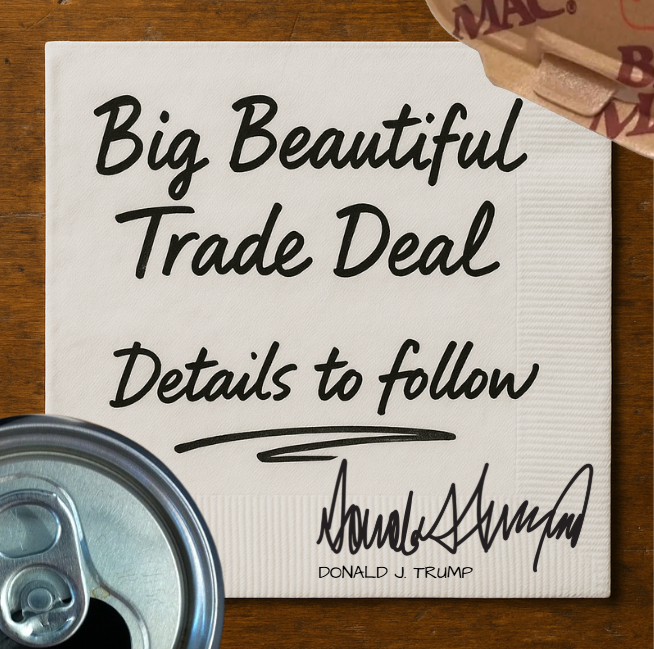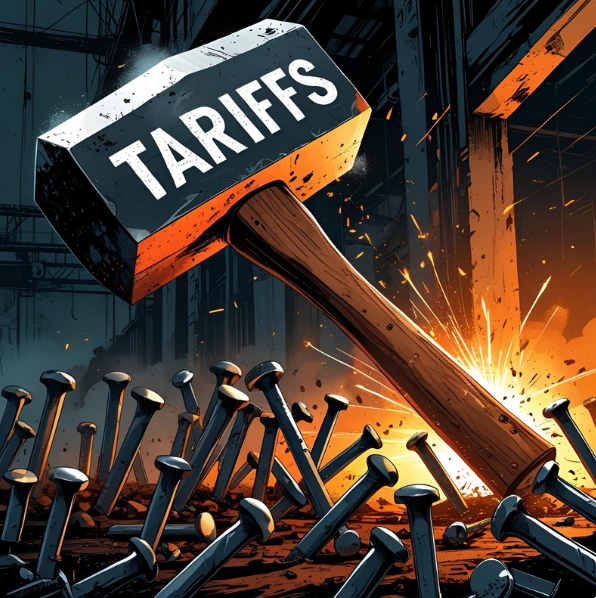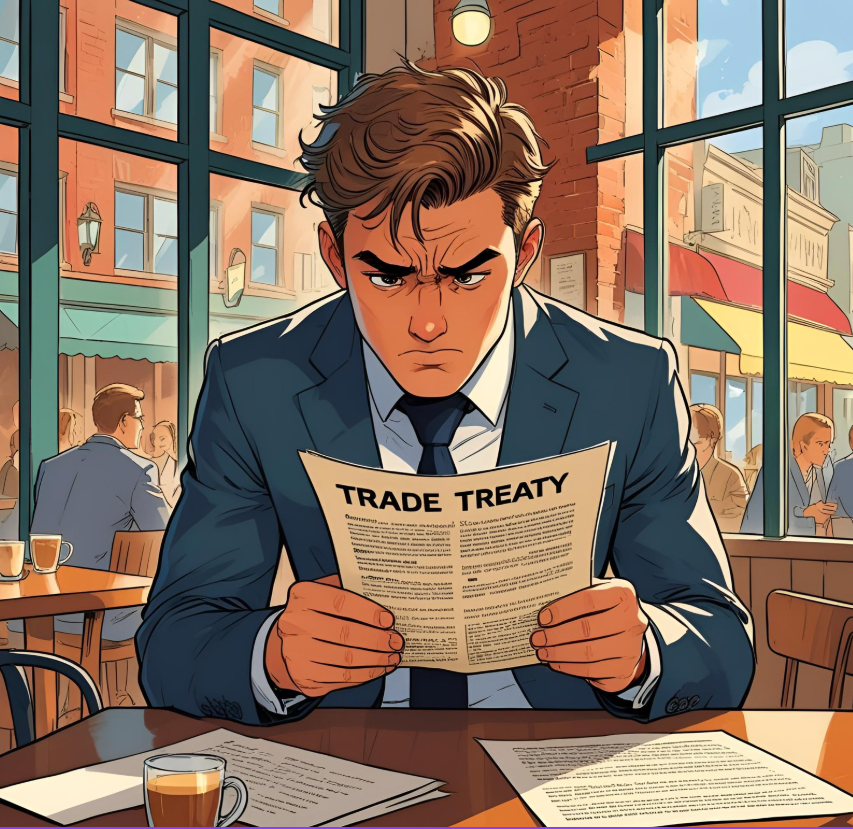Trump’s Trade Threats: Why Isn't This Working?
July 14, 2025
Articles
00
min read time
Dmitry Grozoubinski

KAMEHAME… huh?
In just about every superhero story ever, from Marvel to manga, there is inevitably a scene in which a supremely confident character fires their immensely powerful weapon at a foe - only for the smoke to clear and reveal the target barely singed.
To the extent he is capable of empathy, the US President may now be understanding their bafflement and frustration.
The United States consumer is an immensely powerful economic force on planet earth. US consumption per capita reached a seasonally adjusted $59,901 in the first quarter of this year.
No country with a meaningfully large population (sorry, Luxembourg) even comes close. German households spend just a bit over half of what American ones do every year.
Selling things to Americans is a great way to make money, and there isn’t really another market on earth like that of the US. The Trump administration’s strategy of taking that hostage in order to extort concessions should be working.
Except… it doesn’t seem to be.
Probably the most significant achievements of the Trump trade approach to-date has been getting other countries to the negotiating table and delivering on the President's goal of raising tariffs while limiting retaliation.
To the extent that the President wanted to tax Americans a bit more for buying foreign goods, and did not want others to tax their own citizens for buying American goods, he has largely succeeded.
Similarly, his prediction that if he did so governments and businesses would come calling in the hopes of earning a reprieve, exemption, or carve out has also proven true.
Yet when it comes to those negotiations actually changing how foreign governments behave, triumphs have been somewhat limited.
- The Colombians made token, largely optical concessions on repatriation flights that were occurring anyway;
- The Canadians and Mexicans promised to do things on Fentanyl they’d already done or were already doing, and then later (in Canada’s case) cancelled a digital services tax they weren't wild about;
- The UK offered a small amount of beef access and lowered their tariffs on ethanol, before becoming mired in seemingly endless negotiations about the rest;
- China and the US massively escalated, then drew back, but nothing much occurred beyond that.
- Vietnam appears to have made some tariff concessions, but there’s now a bit of uncertainty about what those are.
With the deadline for the currently suspended “Liberation Day” tariffs rolled back to August 1st, I wanted to list some of the reasons why it’s all proving so difficult.
My Hostages Live At Your House
A key advantage for the United States is that it can create leverage and negotiating capital at any time by just introducing new tariffs on its consumers for buying foreign products.
The downside to that strategy is that everyone knows that.
If a country pays the US “ransom” and the US removes the tariffs it imposed last month, there’s nothing to stop them simply threatening to raise them again next week and demanding something new.
Moreover, the usual mechanisms you would rely on to provide assurances in such a circumstances (legally binding international treaties and/or the personal word of a national leader) are only of limited use when disdain for such things radiates from the US President's every pore.
This might matter a smidgen less if the US were negotiating traditional trade agreements subject to Congressional approval, but for a range of reasons they don’t want to do that.
Thus, there is nothing anyone can do to stop the US putting tariffs up again and again, and nothing the US can sign or say is sufficient assurance they won’t do so in the future.
That makes trading partners reluctant to make big commitments, even in the face of US power.
Buying Real Things with Conjured Coin
There is a weird cognitive bias in the way we tend to think about trade regimes and trade rules - in that we consider long-standing entrenched measures to be a more valid source of negotiating capital than something someone has just created.
Let me explain.
Traditionally, when countries sit down to do a trade negotiation they begin by saying, “here’s what annoys my businesses about your tariffs, rules and regulations and I know there are a bunch of things about mine which annoy your businesses, so let’s see if we can do some trading.”
In essence, the things that annoy your businesses about my trade regime become my negotiating coin, and the things that irritate my businesses about your regime become yours.
I can trade you some of my “coin” by addressing your concerns in exchange for you addressing some of mine.
If a week before sitting down to the negotiation I introduced fifty new measures designed to make life harder for your businesses, that would in theory generate a lot of negotiating coin for me to spend at the table - but that’s generally not how it works in practice. Why?
Because the value of any concession in a trade negotiation is actually a formula:
Value = [ How Much Do You Want This ] x [ How Painful Would This Be For Me To Give ]
That second variable is the issue here.
The US is asking for changes to long-standing, established, and entrenched trade policy measures abroad in exchange for removing tariffs it invented in the last five months using a two variable formula scribbled on the back of a napkin.
If you ask me to do something that is hard, expensive, has a vocal constituency behind it, or would get me demagogued in the press, that massively increases the ‘value’ of the concession and what I can demand in return for making it.
By contrast, the tariffs the Trump administration keeps inventing out of whole cloth and then offering to remove aren’t popular, have no real constituency behind them, and are clearly entirely subject to the whims of the President.
As much as other countries want them gone, it’s clear they’d be near painless for the US to offer up and so above formula assigns them a low value. This makes them hard to leverage.
Deals with the Devil
A devastatingly handsome and disarmingly humble trade geek recently wrote a book about how often trade policy tends to be politics first, economics a distant seventh. You should buy two copies for each of your pets.
One aspect of trade policy becoming political is that the popularity of a country and its national leader abroad can give those they are negotiating with more or less political space to do deals with them.
Any trade deal requires making concessions that are going to piss some people in your country off. If I lower a tariff, the companies who enjoyed tariff protection are going to complain loudly about it.
The less the average voter in your country trusts or likes a foreign leader, the less patience they have for tolerating your making politically painful concessions to them in order to get a deal across the line.
The Trump administration’s rather bellicose America-first rhetoric and general posture is actively limiting the political space other leaders have to make deals. The most obvious example of this is of course Canada, where proximity to Trump cost the opposition leader a double digit lead in the polls and propelled Mark Carney into power on the back of an ‘elbows up’ message.
As a general rule, you want to avoid making fighting you a political slam dunk for foreign politicians - and unfortunately for Trump’s trade policy goals, in many places it is.
You Are Not Prepared
If you want to bully me into making changes to how my system has worked for years by imposing new taxes on your own citizens, I have to believe those new tariffs are here to stay - in other words that they are politically and economically sustainable.
I do not think people are buying it.
Trade wars are as much contests of political will as they are economic clashes. You and another country cause one anothers' citizens, businesses, and government finances pain - the ‘loser’ is whomever screams “uncle” first and comes crawling to the negotiating table with big concessions in hand.
The problem for the United States, which can theoretically cause (most) other countries a lot more pain than they can cause it, is that pain is not measured strictly empirically or objectively.
The US President ran on a campaign of lowering prices and promised everyone that tariffs would be a massive revenue spinner that would painlessly enrich them at the expense of foreigners.
It was a great applause line and clearly had some resonance for Americans stressing about the cost of living, but it left the public completely unprepared emotionally for the reality of attritional economic warfare.
If the President had run on a platform that foreign trade policies are grossly unfair and that the US had to pull together, tighten its belt, lock arms and endure hardships in order to redress that injustice - he’d have a lot more runway to grind down other countries while weathering the domestic economic costs of doing so.
He did not.
For the most part, other countries looking at what the United States is doing are simply dubious about whether the US public has the stomach for the costs and disruptions of introducing and maintaining many of Trump’s threats. That makes them less likely to make big, long term, politically painful commitments.
A sword is significantly less scary if I can see your arm trembling with the strain of carrying it.
Have You Considered… Aiming?
Trade measures at the border can be a precise tool. For example, a government can target tariffs at individual products, from select sources, under specified conditions.
If you sat down and really did the work of figuring out which tariffs would have maximum leverage on foreign governments while minimizing the pain on your own domestic producers and consumers, trade policy has the tools to target your tariffs precisely at just those products.
The Trump administration did not.
Whether through laziness, incompetence, or the President’s clear preference for bold, dramatic moves involving sweeping measures and round numbers, the US deployed its border measures less like a scalpel and more like a flamethrower.
By sidelining USTR and elevating those like Navarro and Lutnick who think details are for wimps, the US has robbed itself of the ability to be truly tactical in how it deploys its vast economic might - at the cost of the political longevity of their own measures.
For the most part, there has been very little effort to minimize the pain to US consumers by avoiding targeting staples, only nominal effort to minimize the pain to US producers by carving out the inputs they need to produce, and utter disregard for investors and supply chain managers through chaotic and opaque rollouts.
The US economy is formidable, but other countries are not seeing it being wielded with any finesse, and thus are considerably less scared of it than they perhaps ought to be given its size and power.
No One Knows Anything, Including You
The President is obviously strongly motivated by being the final decider on every issue, keeping the world guessing about his motivations, interests and final decisions right up until he unveils them with his signature dramatic flair.
The problem with that approach is that it’s very hard for Trump’s negotiators to credibly claim that any deal on the table would be unthinkable or acceptable to him. No one’s ever entirely sure what he wants, or what he’ll accept.
This not only robs the US negotiators of a lot of their agency, but leads the governments they’re negotiating with to seek other clues as to what an acceptable offer might be - and the answer seems to be “not a lot.”
The consistent pattern of the US accepting largely tokenistic, modest, or theoretical concessions in many of its negotiations understandably gives countries pause when contemplating making generous or significant offers.
No one wants to be the sucker that massively overpaid in terms of market access, regulatory reform, or other commitments for something it could have gotten with some flattery, a toothless working group and a Rose Garden signing ceremony.
If countries believe they might be one fawning leader to leader phone call away from Trump overruling his team to give them a deal like the one the UK got, they’re going to hold out before signalling there could be a lot more on the table.
Final Thoughts
If I were playing chess against Magnus Carlsen while he was drunk, blindfolded, watching Inception on his phone, and trying to spell out my last name using his pawns all game, I’d still lose. The gap between us is so large that I think he’d struggle to give me the win even if he were deliberately sabotaging himself - crushing me on muscle memory alone.
In negotiations with smaller countries that have a significant dependency on the US market for their exports and face competition from abroad, the US can and will extract some concessions. Hostage taking works when the hostages are valuable enough, and the US consumer is a very valuable hostage indeed.
With all that said, I think it’s important to understand precisely why the US is struggling to execute all this despite a leader who is clearly committed to extortion as a principle - and is apparently unrestrained by Congress or US checks and balances.
Strategy, competence and hard work matter, even in the execution of ideas we’re not fond of - and having the biggest gun in the room doesn’t help when you neglect to aim, aren’t sure you own the bullets, and keep dropping it on your toes.
More of me:
- Book: Why Politicians Lie About Trade
- Public Speaking (CWG Speakers)
- Trade and Geopolitics Consultancy (Aurora Macro Strategies)





